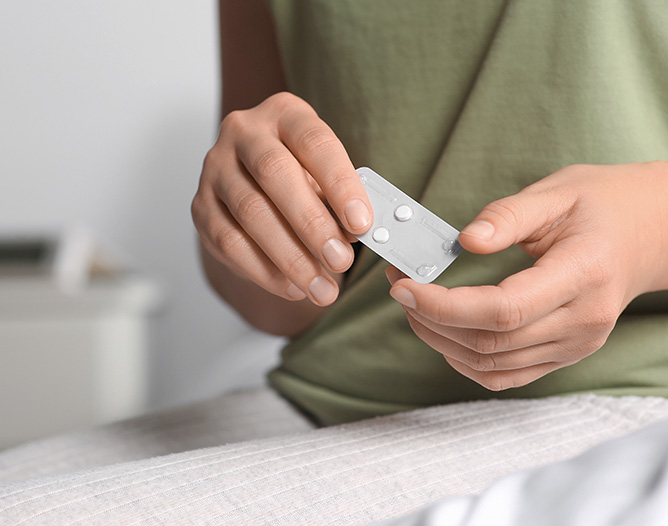At MAIA, we understand how important it is to have all the information available on safe and effective contraception options. There are many myths and misconceptions about birth control, and we’re here to help you sort fact from fiction.
Oral Contraceptive Pills
Oral contraceptive pills are one of the most popular forms of contraception used today. They are relatively convenient. You simply need to take a pill every day at the same time. The pills can take up to 12 days to start working, and you typically receive a pack of 28 pills, including hormone pills and sugar pills.
How do they work? They thicken the fluid around the cervix to block the sperm from getting through. They also stop ovulation by preventing the ovaries from releasing an egg. They are up to 99% effective at preventing pregnancy.
There are two different types of oral contraceptive pills, including:
- Combined pill: contains estrogen and progestogen
- Progestogen-only pill: only contains progestogen and is often used for people who have adverse side effects to the combined pill
IUDs
An intrauterine device (IUD) is a small contraceptive device that is placed in your uterus. There are two different types of IUDs available: copper IUDs and hormone-releasing IUDs. The copper IUD lasts for 10 years, and the hormone-releasing IUD lasts about 3-8 years.
An IUD stops sperm from reaching and fertilizing an egg.
The copper IUD can also be used as emergency contraception.
IUDs are inserted into the uterus through the cervix. It can be removed at any time by your doctor and won’t stop you from becoming pregnant in the future.
Injections
If a pill or IUD isn’t the right option for you, many women choose the contraceptive injection. Also known as Depo (Depo-Provera or Depo-Ralovera), the injection contains progestogen and stops ovulation and thickens the fluid at the opening of the uterus to stop sperm from getting through. It’s up to 99% effective. The injection typically lasts 12-14 weeks and requires you to come back into the clinic for another injection. Injections do not protect against STIs, so condoms are still necessary.

Vaginal Ring
The vaginal ring (or NuvaRing) contains oestrogen and progestogen, like the combined pill, and slowly releases the hormones from the vagina and into the bloodstream. It has been shown to be 99% effective and stops the ovaries from releasing an egg each month.
Vaginal rings are self-inserted, and you typically keep it in for three weeks. For the fourth week, you’ll take it out, wait seven days, and then insert a new ring. When the ring is removed, you will get your period.
The vaginal ring does not protect against STIs/STDs, so you will still need to use a condom.
#1 GROUP OF GYNECOLOGISTS IN THE CHICAGO AREA!
Renowned Expertise
Dr. Wolowick and Dr. Mitchell are renowned for their exceptional expertise and dedication to patient care. Their comprehensive knowledge and innovative approaches have consistently led to outstanding treatment outcomes. Patients and colleagues alike deeply appreciate their commitment to advancing medical practice and improving patient well-being.
Meet The Team

Condoms
The external (or male) condom is typically made of latex and is a pouch that is put over the erect penis to stop sperm from going into the vagina. There are also non-latex versions for anyone who is allergic to latex. Condoms can be used by anyone who is sexually active. They are 98% effective. They also reduce the risk of HIV and STD transmission.
Diaphragm
A diaphragm is a soft silicone dome that fits in the vagina. When inserted in the vagina, it covers the cervix, stopping the sperm from getting through to the uterus. You keep it in during sex and at least six hours after sex, but it should not be left in for any more than 24 hours.
Diaphragms are about 86% effective and don’t always fit everyone comfortably. They also don’t protect against STIs, so a condom still needs to be used.
Tubal Ligation
Tubal ligation is a form of permanent birth control. Often referred to as having your tubes tied, it is typically performed laparoscopically with general anesthesia to ensure you’re comfortable throughout the surgery.
The type of tubal ligation you have depends on a number of factors. Dr. Wolowick and Dr. Mitchell may place clips on each fallopian to block the sperm and egg from meeting, or the fallopian tubes can be removed entirely instead of clipped. Because the ovaries are not affected, this can be an effective birth control method for those who are not able to take hormonal birth control. This method does not affect your period.
Emergency Contraception
Emergency contraception is used after unprotected sex to stop an accidental pregnancy from occurring. Whether a condom broke, you missed a pill, or no contraception was used, emergency contraception can ensure you don’t become pregnant.
Some forms of emergency contraception available today include the copper IUD and the pill (often called the “morning after pill”).
Copper IUD
The non-hormonal copper IUD is a very effective method of emergency contraception. It works by making it difficult for a fertilized egg to stick to the lining of the uterus. It can be inserted within five days of unprotected sex, and once inserted, it can be an effective form of contraception for 5-10 years.
Emergency Contraceptive Pill
The emergency contraceptive pill stops or delays the ovaries from releasing an egg. It should be taken as soon as possible after unprotected sex to prevent an accidental pregnancy. It’s about 85% effective and available at most pharmacies without a prescription. This is not meant as an effective method of contraception to use regularly.
Frequently Asked Questions
What are the different types of contraceptives?
How do I know which contraceptives will be best for me?
How effective are oral contraceptives?
What are the benefits of an IUD compared to oral contraceptives?
Are all contraceptives covered by insurance?
Do contraceptive injections have side effects?
Which contraceptive types will cause you to not have a period?
What are the side effects of oral contraceptives?
Is it safe to use contraceptives for many years?
Which contraceptive type is the most popular?
Schedule A Consultation Today
Want to learn more about effective contraception options and which ones are right for you? Don’t hesitate to call our Downers Grove, IL office at 630-320-6703 or fill out our online contact form. We happily serve the Aurora, Naperville, Downers Grove, and Chicago, IL areas.
Dr. Wolowick or Dr. Mitchell can walk you through your options, possible side effects, effectiveness, and more during your consultation.




